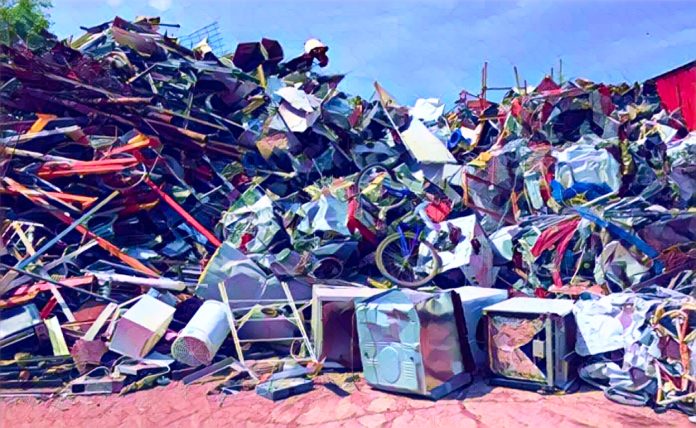KEY POINTS
-
Gen Z Nigerians are redefining the scrap metal trade by integrating digital tools, social media, and eco-conscious practices to scale and professionalize the business.
-
Young entrepreneurs are using mobile apps, cashless payments, and online platforms to expand operations, while also addressing environmental concerns through upcycling and recycling.
-
Despite regulatory challenges and limited government support, this youth-driven movement is boosting exports, reducing urban waste, and creating new employment models in the circular economy.
In the bustling outskirts of cities like Lagos, Kano, and Port Harcourt, a new revolution is underway — but not in tech or fashion, as many might expect from Nigeria’s Gen Z.
Instead, it’s playing out in scrapyards, welding shops, and the dusty corners of informal markets, where young Nigerians in their 20s and early 30s are quietly transforming the scrap metal economy into a goldmine of opportunity, sustainability, and digital innovation.
Once seen as the preserve of older men and rural traders, the scrap business — collecting, sorting, and selling recyclable metals like iron, copper, brass, and aluminum — is now witnessing a cultural and entrepreneurial shift.
A growing number of Gen Z Nigerians are bringing fresh energy, business acumen, and technology to the trade, leveraging social media platforms, logistics apps, and even cryptocurrency to redefine what was long considered a low-income hustle.
“We’re not just picking scrap anymore,” says 27-year-old Mustapha Bashir, a former engineering student turned scrap entrepreneur in Kaduna. “We’re creating systems, networks, and sustainable models that turn waste into wealth. This is green entrepreneurship.”
Gen Z is digitizing, branding, and scaling the scrap trade with innovation
What differentiates this new generation of metal traders is their use of tools previously unseen in the sector. Many now operate Instagram and WhatsApp storefronts showcasing recycled art, refurbished machine parts, and custom-built industrial tools made from salvaged metal.
Others run YouTube channels teaching viewers how to identify valuable metals, optimize scrap collection routes, or navigate fluctuating commodity prices.
Technology is at the heart of this shift. Mobile payment systems like Flutterwave and Opay cashless transactions with large-scale buyers, while bike-hailing and delivery apps such as Gokada and Bolt assist with logistics.
Some are even collaborating with software developers to create mobile platforms that link scrap collectors with buyers in real-time.
“I built a simple app where people in my area can request a pickup for their old fridges, AC units, or car parts,” says Adaeze Okonkwo, a 25-year-old in Enugu who left a digital marketing job to start her metal recycling business. “We clean, separate, and resell the components. It’s both eco-conscious and profitable.”
Beyond profits, there’s a strong environmental awareness driving this movement. Gen Z entrepreneurs are responding to the urgent need for climate action and sustainable waste management in Nigeria, a country battling high levels of urban pollution and limited recycling infrastructure. Through upcycling and responsible material disposal, they are carving out a role in the circular economy — often without waiting for government support.
According to data from the National Bureau of Statistics, Nigeria’s scrap metal exports increased by over 40% between 2022 and 2024, driven largely by private-sector innovations. Informal recyclers — many of them now younger, tech-savvy Nigerians — contributed significantly to this surge, supplying metals to manufacturers in Asia and Europe.
Still, challenges persist. Regulatory hurdles, the occasional harassment by local authorities, and the volatility of global commodity prices continue to impact the sector. Moreover, the federal government’s 2021 ban on the export of scrap metals — though partially lifted for processed goods — has kept some entrepreneurs operating in legal grey zones.
“We need recognition,” says Chinedu Onuoha, who manages a cooperative of scrap workers in Abia State. “Young people are redefining this industry, but policies are not catching up. We want to be part of the national development agenda, not pushed out of it.”
Some state governments, however, have started to take notice. In Lagos, the Ministry of Environment recently partnered with youth organizations to promote eco-businesses, including scrap recycling. Training programs on metal safety, small-scale smelting, and business registration are being piloted in collaboration with NGOs.
Meanwhile, more young Nigerians are joining the movement every day, drawn by low startup costs, growing demand, and the promise of turning overlooked waste into economic freedom.
“This is not just a business,” says Mustapha Bashir. “It’s our way of proving that you don’t need a big office or a white-collar job to build something powerful. We’re cleaning up Nigeria and making money doing it.”



